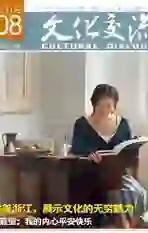《红星照耀中国》曾在《北平新闻》首发
2018-08-06巫少飞
巫少飞
造访杜新一先生时,他正在整理其父杜瑰生先生(1915年—2015年)遗留下的史料,其中一张1937年5月10日出版的英文版《北平新闻》报,引起了笔者的浓厚兴趣。
众所周知,《红星照耀中国》(即《西行漫记》)是美国著名记者埃德加·斯诺的不朽名著。据衢州地方志载,这部作品的英文初稿,是在《北平新闻》上刊出的,它首次向全球报道了延安的真实情况。
一张《北平新闻》上的内容
这张1937年5月10日出版的《北平新闻》有3至4版,长约54厘米,宽约39厘米。3版为“星期画刊”,4版为“书评专栏”。根据徐龙华、巫文一的翻译,内容大致如下。
“星期畫刊”刊登有19张图片。主要内容是国军第29军军长宋哲元(1885—1940)在张家口检阅部队、发表演讲、慰问孤儿等。图片中,宋哲元将军或持枪、或视察、或眺望远方……
1917年7月,张勋在北京拥戴清朝废帝溥仪复辟,冯玉祥兴兵讨伐,宋哲元率部进攻北京击败张勋的部队。宋哲元是西北军五虎上将之一,1931年“九一八事变”爆发后的第3天,宋哲元即率第29军全体官兵,向全国发出“抗日通电”。1933年3月,宋哲元指挥第29军将士在长城要隘喜峰口、罗文峪与日军展开血战。第29军以大刀队与日军展开搏斗,经过激战,获喜峰口大捷,震动全国。1937年,以喜峰口血战为背景创作的歌曲《大刀向鬼子们的头上砍去》唱遍了全中国。
此外,“星期画刊”上还有当地学校的女学生运动会、为前线筹款、举办画展等图片消息。
《北平新闻》上的“书评专栏”,第一篇文章是介绍意大利作家伊尼亚齐奥·西洛内的小说《面包和酒》。伊尼亚齐奥·西洛内是意大利作家和政治家。伊尼亚齐奥·西洛内致力于抨击法西斯主义,1931年流亡瑞士。《面包和酒》是20世纪最重要的小说之一,描写了法西斯在意大利的崛起过程。
“书评专栏”第二篇文章介绍《列宁信札》一书。《列宁信札》收集了列宁的340封信件,由伊丽莎白·希尔和多丽丝·米迪译自俄文并进行注释、编辑,加了传记评论。其中一篇是列宁在柏林写给其母亲的信,在信中列宁讲:“我定居此地,感到非常快乐。蒂尔加滕公园离我的住处只有几码远(它是一个漂亮的花园,是柏林最大最好的公园)。还有我每天要去游泳的施普雷河和火车站。”可列宁烦恼于语言不通:“唯一的麻烦是语言。我听不大懂德国人之间的交谈,水平远不如法语。德国人的发音总是很特别,我甚至不懂他们在公众演讲中使用的词汇。而在法国,我几乎从一开始就听得懂同样的演讲。”当然,列宁也很好学:“前天,我去剧院看戏,他们在演出霍普特曼的戏剧《织工们》。为了跟上演出,我在演出前再次阅读了剧本。尽管如此,我还是抓不住只言片语。”
“书评专栏”第三篇文章介绍了美国杰出的记者威斯·威廉姆斯的书《帝国的黄昏》。威斯·威廉姆斯当时判断,和平遭受了暴风雨般的打击,欧洲旧世界已经衰落。
衢州人创办了《北平新闻》
《北平新闻》积极宣扬抗日,经常刊登苏联塔斯社电讯和各种抗日消息。
据《衢州市志》《衢县志》载:民国二十四年(1935),卫士生回国,与戈定远等人创办北平新闻社及英文报《北平新闻》,任社长兼总编辑。
卫士生(1899—1990)是衢州市区人,在清华大学期间,吴宓、朱自清等曾是他的老师。1933年、1934年,卫士生分别获得美国哥伦比亚大学、纽约大学两所大学的哲学博士学位。留学期间,卫士生加入中国农工大同盟和反帝大同盟,与共产党人徐永英、章汉夫等人创办英文杂志《中国评论》月刊,任总编辑,报道日军在中国的暴行,反对帝国主义侵略,声援世界各国人民的革命。1937年7月北平沦陷时,卫士生被日军逮捕,后经营救出狱,转入内地参加爱国民主运动。抗战期间,卫士生曾在重庆八路军办事处为周恩来任英文翻译。
卫士生是民主同盟成员、知名的爱国人士。历任中央大学、重庆大学、浙江大学等校教授,系教育部留考委员会主委,外交部、经济部顾问,联合国中国同志会秘书长等。1949年以后,卫士生任中央军委工程学校英语教授、武汉市人民政府参事等职。
由于卫士生曾任武汉市人民政府参事,2014年9月,《长江商报》刊发了一则启事——武汉全球寻找政府参事“老故事”。文中提到,卫士生这个名字或许不太知名,但美国作家埃德加·斯诺访问延安后所写《红星照耀中国》英文初稿,就是在卫士生等人创办的《北平新闻》上刊出的,为中国首次向全球报道延安的真实情况。
戈定远(1901—1977)又名卓超,为原衢县黄家乡吕宅村人。1923年,戈定远毕业于公立法政专门学校,后任北京法律馆科员、中国驻苏联特罗巴领事馆主事。1926年冯玉祥访苏,戈定远随同回国,入西北军,任冯玉祥秘书。1929年,戈定远任国民政府陆军署军法司长。次年冯玉祥反蒋介石失败,冯部被收编后,戈定远任29军秘书长,后随军长宋哲元在长城喜峰口抗击日本侵略军。1935年,戈定远任第四届立法委员,冀察政务委员会委员、秘书长。
抗战爆发后,戈定远受原西北军抗日将领派遣,进沦陷区徐州一带做抗日工作,策反汪伪军。抗战胜利后,戈定远任第三绥靖区司令冯治安顾问。1949年后,戈定远任中国国民党革命委员会团结委员、浙江省政协委员、全国政协委员。
这张《北平新闻》的来历
据叶向阳先生《中国近现代时期北京的英文报》记载,上世纪30年代,中国人在北京创办过两份英文报,一份是《英文平西报》,另一份就是《北平新闻》。
据笔者调查,衢州市的博物馆、图书馆、档案馆等均未收存《北平新闻》,在衢州的民间收藏中也没出现过此报。笔者在网络上搜索,也没找到关于《北平新闻》的任何资讯。所以这张《北平新闻》非常珍贵。
《北平新闻》的创办人卫士生、戈定远,早年就读于衢县高等小学(现衢州市鹿鸣小学)及浙江省第八中学校(现衢州一中),是民国期间衢州著名教育家杜宝光先生的学生。任《北平新闻》经理的周与九(名志谦)先生是杜宝光夫人的表弟,毕业于浙江省第八中学校,后曾在商务印书馆工作。在1935年至1937年《北平新闻》发行期间,周与九陆续将《北平新闻》从北平寄到衢州。由于岁月久远,加之战乱频仍,现存的《北平新闻》仅此一张。
杜瑰生曾在《北平新聞》的边栏写有一段注文,从中可知,《北平新闻》的主编为卫士生,经理为周与九,社长为戈定远。而实际主笔亦为卫士生,民国期间,报刊主笔是报刊思想的发源人物,主笔是一家报刊的核心人物。
1937年,周与九曾邀杜瑰生去《北平新闻》工作,终“以倭寇凭陵,未往焉。”1938年1月,出狱后的卫士生曾回衢探望母亲,然自其母亲1948年去世后,卫士生再没回家乡。晚年的卫士生对家乡衢州非常眷恋,在他于上世纪80年代写给杜瑰生的20多封信中,多次提及家乡的故人往事,回想起衢城的水亭街、坊门街、北门街、钟楼、鼓楼等,“我真想回衢一叙”,其拳拳思乡之情跃然纸上。1990年卫士生去世,武汉市人民政府参事室专门致函杜瑰生并附上卫士生生平事略。
那些沾满油墨的文字、图片,是纸里包着的火。那些远去的报纸、报人,不但抒写着历史,也抒写着我们民族命运的心路历程。
Edgar Snow wrote in 1937 after his 1936 visit to Yanan in the west of Shaanxi Province where the Chinese Communist Party operated a central revolutionary base. According to the local annals of Quzhou, a city in the southwest of Zhejiang Province, the first English version of Snows reportage was published in , an English-language newspaper founded and published in Beiping (now Beijing) by Wei Shisheng and Ge Dingyuan in 1935. Both Wei and Ge were natives of Quzhou.
The other day I visited Du Xinyi at his home in Quzhou. He was sorting out the historical documents of his father Du Guisheng (1915-2015). I spotted an original issue of dated May 10th 1937. Then I visited the local museum and archives in Xuzhou. The two institutions dont have in their collections. Therefore this newspaper dated May 10th, 1937 in the hands of Du Xinyi is the only existing copy of the newspaper in Quzhou. This copy has page 3 and page 4 of the newspaper, in a format of about 54 cm tall and 39 cm wide.
Though the newspaper in Dus collection doesnt carry any serialized passages of Edgar Snows famous book, it does offer an insight into what it was all about nearly 80 years ago. Page 3 presents 19 photos featuring General Song Zheyuan (1885-1940) visiting Zhangjiakou, a fortress city in near Beiping. Page 4 carries three book reviews.
Wei Shisheng (1899-1990) acquired PhD degrees from Columbia University and New York University respectively in 1933 and 1934. During his studies in USA, he jointly published , an English-language monthly, in partnership with two communists Xu Yongying and Zhang Hanfu. Wei was editor-in-chief of the monthly magazine. According to and , Wei set up in 1935 and served as its president and editor-in-chief. He was thrown into prison in July 1937 when Japanese invaders conquered Beiping. He was released thanks to a coordinated rescue operation. During the war years, he frequently acted as an English interpreter for Zhou Enlai at the Chongqing Office of Eighth Route Army, which was under the leadership of the Chinese Communist Party.
Wei taught in Central University, Chongqing University and Zhejiang University in his lifetime. After 1949 he served as a counselor for a while for the Wuhan Municipal Peoples Government. In September 2014, based in Wuhan printed a request asking for detailed information on some counselors that had worked for the city government. The request aimed to find lifetime stories about some counselors who contributed to the development of the city and witnessed its historical changes but whose stories were lacking. In the story printed in the newspaper, Wei Shisheng was mentioned. “The name Wei Shisheng may remain unknown to most people, but , a reportage penned by Edgar Snow after his 1936 visit to Yanan, was first printed in published by Wei Shisheng and his colleagues. It was Chinas first report about Yanan to the world,” said the newspaper.
Ge Dingyuan (1901-1977) was from Lyuzha Village, Huangjia Township of Qu County. After he graduated from a law school in 1923, he worked as a law officer in Beijing and then at a Chinese consul in the Soviet Union for a while before he worked as a secretary for General Feng Yuxiang in 1926. In 1929, Ge took the position of the military law director of the national government. He worked in the military for years and fought the invading Japanese. After the victory of Chinas War of Resistance against Japanese Aggressors, he acted as a security advisor for a while. After 1949, he served as a deputy of both the CPPCC Zhejiang and the national CPPCC.
Wei Shisheng and Ge Dingyuan went to Xu County Senior Primary School and Zhejiang Number 8 Middle School. One of their teachers was Du Baoguang, a famed educator in Quzhou during the Republican years. Zhou Yujiu, business manager of , was a cousin of Du Baoguangs wife. Zhou worked at Commercial Press. existed from 1935 to 1937. Zhou mailed copies of the newspaper back to Quzhou. Most of these copies were lost in history. Du Guisheng jotted down a note on the margin of the existing copy. According to Du, Zhou Yujiu was the business manager of the newspaper, Ge Dingyuan was its president and Wei Shisheng was the editor in chief. During the Republican years, the editor-in-chief of a newspaper usually acted as the soul of printed reports. In 1937, Zhou Yujiu invited Du Guisheng to work for , but Du didnt go to Beijing primarily because of the ongoing war.
Wei Shisheng came back home to visit his mother in January 1938. After his mother passed away in 1948, Wei never visited Quzhou again. In the 1980s, he wrote about 20 plus letters to Du Guisheng. In the letters, he wrote about his memories of the hometown and said how he wished to visit Quzhou and meet Du again. Wei passed away in 1990. The counselors office of Wuhan Municipal Peoples Government sent a special letter to Dui Guisheng after Weis demise. Attached to the letter was a brief biography of Wei Shisheng.
